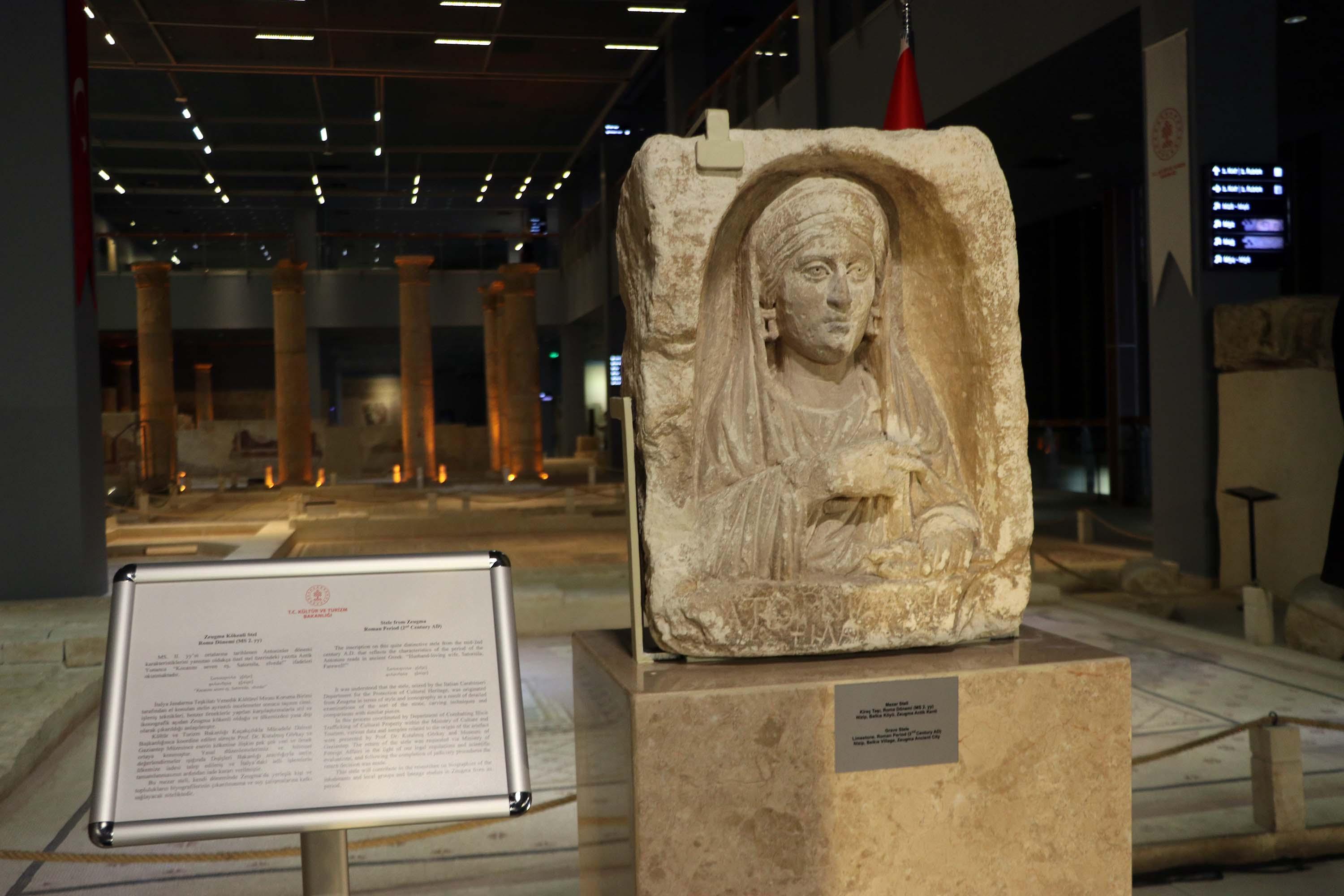Türkiye receives ancient tomb stele repatriated from Italy
GAZİANTEP

A centuries-old tomb stele smuggled from the ancient Turkish city of Zeugma to Italy has been returned to its home, Turkish Culture and Tourism Minister Mehmet Nuri Ersoy announced on July 13.
A stele is a standing stone slab used in the ancient world for several purposes, including grave and tomb markers, dedications, commemorations and demarcations.
The repatriated tomb stele depicts a noblewoman, wearing a veil and a tunic. Her right hand is placed on her left breast. Under the bust refiguring the deceased is an inscription in ancient Greek reading, “Satornila, the wife who loves her husband, farewell!”
The Venetian authorities seized the Zeugma-origin stele, which was smuggled years ago from the southeastern province of Gaziantep’s Zeugma region, and then contacted the Turkish Culture and Tourism Ministry, requesting information about the work.
As a result of the research conducted by Prof. Dr. Kutalmış Gürkan, the head of the Zeugma excavations, it was determined that the artifact was of Zeugma origin.
Upon the determination, the process of its return to its homeland was initiated.
"In 2018, when I started my duty as the minister, I met with members of the press once again in this museum and together celebrated the return of the 12 pieces surrounding the mosaic known as the Gypsy Girl from the U.S.,” Ersoy said during his speech at a press conference at Zeugma Mosaic Museum.
“Today, after years, we have come together here for the return of a very special stele from Italy."
"The challenging period that our city and region have gone through makes the return of this stele, which symbolizes the richness and value of this land, even more precious and meaningful,” Ersoy said.
In early February, the 11 southern provinces, including Gaziantep, jolted by the devastating earthquakes, claimed the lives of more than 50,000 people and caused severe damage to many historical structures and museums.
The Zeugma Museum remained closed for 74 days following the earthquakes.
‘Stele tells 2,000-year-old love story’
Zeugma, which means "bridge" in Turkish, has been the site of unique artworks throughout its ancient history dating back to 300 B.C., said Ersoy, recounting the story of the stele.
The returned stele was erected in the second century A.D. in the city by a Zeugma resident who deeply loved her spouse and bid farewell him with touching words inscribed on the stele, Ersoy said.
"On the stele, we see expressions of love for a spouse and farewell. This artifact carries a 2,000-year-old love story encompassing strong emotions such as separation, sorrow, and loyalty."
The minister also expressed his gratitude to the Italian authorities who contributed to the return of this valuable cultural asset, emphasizing that Italy has also experienced the same victimization as Türkiye in terms of illicit trafficking of historical artifacts.
Stating that the number of countries signing agreements to prevent the illegal circulation and promote the return of cultural artifacts has reached 12, Ersoy said, "We carry out our efforts for the preservation of cultural assets with the principle that every artifact is beautiful and meaningful in its own homeland, without making any concession.”
Some 12,016 artifacts have been returned to Türkiye over the past 20 years from various countries, the minister added.
"These agreements play a crucial role in facilitating collaboration among these countries and preventing the looting of our priceless artifacts, each of which is a part of our culture," Ersoy said.
Within the scope of these cooperations, the ministry expects new repatriations in the future, said Ersoy.
The Zeugma Mosaic Museum opened in 2011 and is one of the world’s largest mosaic museums. It holds unique ancient artifacts such as mosaics, Roman-era fountains, a bronze sculpture of Mars – the god of war in Roman mythology – and the famed Gypsy Girl.
Zeugma, on the Euphrates River, was first an ancient Greek settlement and later became part of the Roman Empire. It was founded around 300 B.C. by a general of Alexander the Great.
















